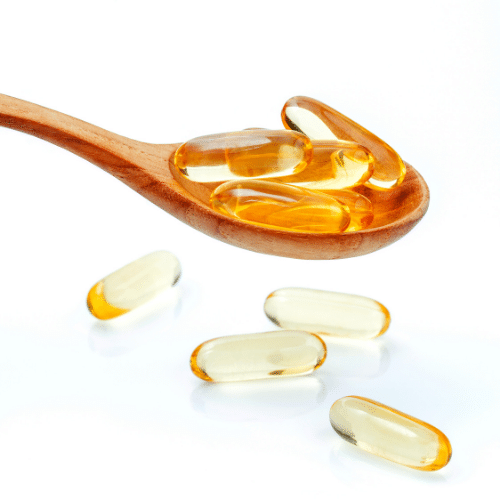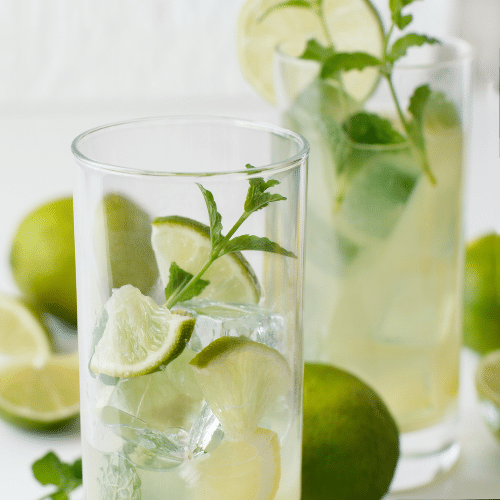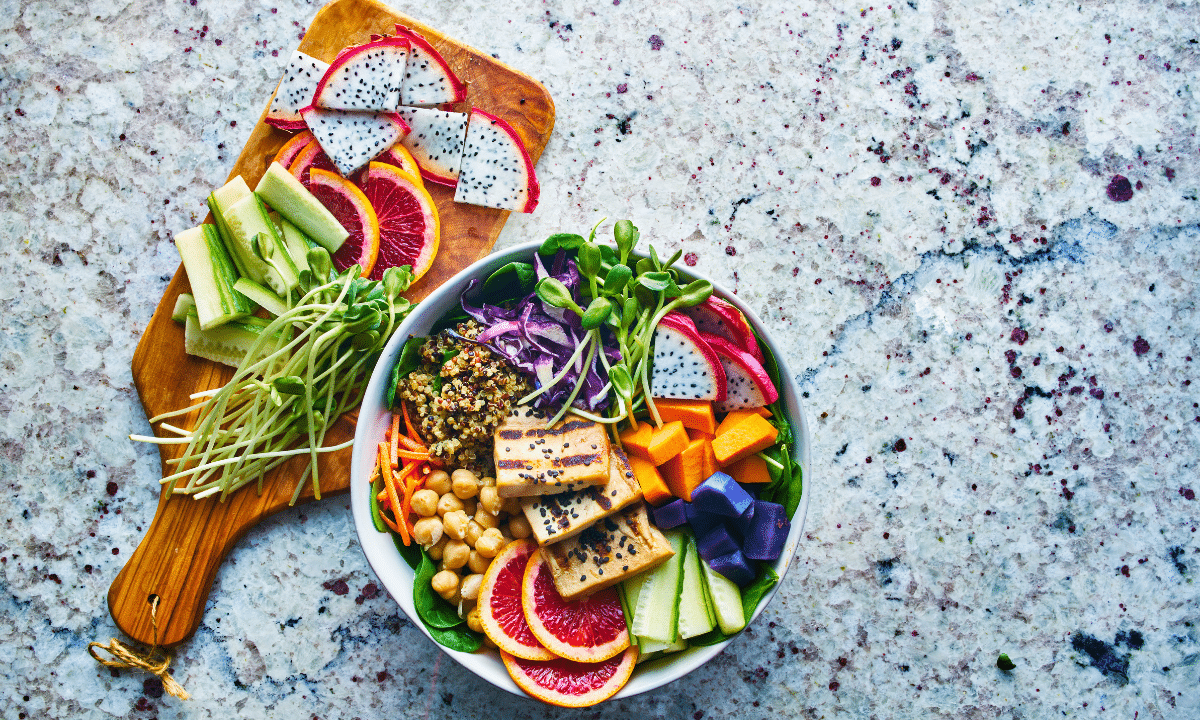Heal Your Body With an Anti-Inflammatory Vegan Diet
An anti-inflammatory vegan diet can help you feel your best by reducing the harmful chronic inflammation resulting from an inadequate diet, stress, disease, or the environment.
Table of Contents
ToggleThe main goal of this diet is to reduce chronic inflammation linked to difficulties losing weight, pain, chronic fatigue, depression, anxiety, mood disorders, gastrointestinal complications, lower energy, and frequent infections (1).
Sounds great, right? However, it can be difficult to know what you should eat if you’re unsure which vegan foods are anti-inflammatory. This blog post will teach you how to identify and avoid the most common inflammatory food items to stay healthy while still enjoying your favorite meals!
About inflammation
It’s important to recognize that inflammation is not the enemy. In fact, it’s a natural and necessary part of our immune system response to injury or infection. When your body senses danger, it sends out chemicals called cytokines to help defend against the threat.
The problem is that inflammation is chronic and not loner protects you but affects your health and quality of life.
Chronic inflammation can be caused by a variety of things such as genetics, infections, injuries, chronic disease, stress, or diet.
Unfortunately, our Western diet is rich in pro-inflammatory omega-6 fats and processed foods loaded with additives and chemicals.
People following vegetarian diets naturally eliminate inflammatory foods such as red meat and other animal products. However, even if you follow a vegetarian diet, you need to choose healthy foods that reduce inflammation and decrease sugar and processed foods.
What is an Anti-Inflammatory Vegan Diet?
While there is no specific diet plan to follow in the anti-inflammatory diet regarding portions or exactly what to eat, focusing on eating more anti-inflammatory foods and less inflammatory foods work well.
The anti-inflammatory diet adds more whole foods filled with antioxidants while avoiding processed foods, sugar, and alcohol.
In other words, the anti-inflammatory meal plan consists of eating fruits, vegetables, whole grains, legumes, and healthy fats. In addition, it encourages adding anti-inflammatory herbs and spices such as ginger, cumin, garlic, and cinnamon.
Last but not least, the anti-inflammatory vegan diet avoids all animal proteins.
Benefits of an Anti-inflammatory Diet
- Reduces inflammation (2)
- Improved energy and mood (3)
- Decreased risk of obesity and heart disease (4)
- Decreased anxiety and depression (5)
- Better blood sugar control (6)
- Improved metabolic syndrome (7)
- Decreased risk of Alzheimer’s (8)
- Improved arthritis symptoms (9)
- Body pain, arthralgia, myalgia.
Anti-inflammatory vegan foods
| Vegetables | Brussel sprouts, cabbage, cauliflower, broccoli, kale, spinach, sweet potatoes, leafy greens, bell peppers, tomatoes, carrots, and most vegetables. The goal is to consume 3 cups of vegetables a day. |
| Starchy vegetables | Sweet potatoes, pumpkins, potatoes. |
| Fresh fruit | Cherries, fresh berries, grapes, citrus fruits, etc. The goal is to eat up to 2 cups a day. |
| Unprocessed plant-based proteins | Minimal process soy foods such as tempeh, tofu, miso, and edamame. |
| Legumes | Beans, lentils, peas, chickpeas, soybeans. |
| Whole Grains | Gluten-free oats, buckwheat, millet, barley, quinoa, brown rice. |
| Nuts and seeds | Almonds, cashews, chia seeds, hemp seeds, walnuts, flaxseed, nut butter (as natural as possible) |
| Chocolate | Dark chocolate-unsweetened |
| Herbs and spices | Cinnamon, nutmeg, turmeric, ginger, garlic, cayenne, black pepper, basil, oregano, cumin, thyme, clove, and cinnamon. |
| Tea | Green and herbal tea. |
| Healthy oils | Avocado oil, coconut oil, extra virgin olive oil. |
| Omega 3s | Omega 3s Walnuts, flax seeds, walnuts, seaweed, algae, chia seeds, hemp seeds, and soybeans |
Anti-inflammatory spices
Several natural herbs and common spices help decrease inflammation, including ginger, turmeric root, black pepper (allspice), cayenne pepper, cinnamon sticks, and cloves.
Inflammatory food (foods to minimize)
| Sugary drinks | Fruit juices, sugar-sweetened beverages, energy drinks, and other drinks with added sugar. |
| Desserts | Candy, cake, ice cream, cookies, and other desserts. |
| Added sugars | Added sugars are listed on food labels. The goal is to limit added sugars to no more than 25 grams for women and 35 grams for men. |
| Refined carbohydrates | White pasta, white bread, white rice, white flour, pastries, and other white carbs |
| Wheat and gluten | Pasta and bread |
| Processed soy foods | Soy frankenfoods like meat analogs, soy bars, soy yogurts |
| Processed snacks | All processed snacks, including potato chips, candies, and other processed snacks |
| Fast foods | Avoid eating all types of fast foods. |
| Oils | Proceed seed oils and vegetable oils, safflower oils. |
| Trans fats | Products with partially hydrogenated oils. |
| Dairy | Cheese, milk, and yogurt. |
| Alcohol | Wine, beer, spirits, cocktails, and especially alcohol mixed with sugar. |
Examples of Anti-Inflammatory Meals
Breakfast
- Gluten-free oatmeal with walnuts and berries
- Scrambled tofu with vegetables
Lunch
- Portobello mushroom tacos
- Vegan lentil-carrot soup
Dinner
Snack
- Hummus and carrots
- Pistachios and fruit
| For vegan, anti-inflammatory Mexican recipes, get my book: Mexican Vegan Recipes. |
Supplements
You hear it all the time: Supplements can help inflammation and boost your overall health, so now’s the time to get on a regimen. But which ones?
There is some evidence that omega-3 fatty acids (10), alpha-lipoic acid (11), resveratrol (12), and vitamin C (13) can improve inflammatory biomarkers.
That being said, it is also important to get nutrients from foods too! Supplements often help reach the therapeutic levels but might not work as well as eating real foods.
Omega 3-fatty acids

Overall, the defining influence of omega-3 fats such as DHA is their anti-inflammatory effects (14).
In particular, upping your DHA intake can help counter the excess of inflammatory omega-6 fats found in soybean and corn oil, typical fats found in processed foods.
Vegetarian sources of omega-3 fatty acids include flax seeds, walnuts, seaweed, algae, chia seeds, hemp seeds, and soybeans.
Alpha-lipoic acid
The anti-inflammatory properties of alpha-lipoic acid have been suggested in different research studies (22). This nutrient is found in spinach, broccoli, yams, potatoes, tomatoes, Brussels sprouts, carrots, beets, and rice bran.
Resveratrol
This nutraceutical is well known for its several therapeutic benefits, including its role in decreasing inflammation (24)
Vegan sources of resveratrol include grapes, grape products, peanuts, pistachios, red and white wine, blueberries, cranberries, cocoa, and dark chocolate.
Vitamin C
Vitamin C plays such a big role in overall health, including inflammation!
The good news is that this vitamin is easy to find in foods most people love, such as oranges, limes, and lemons. Moreover, this vitamin is found in most fruits and vegetables that are red such as tomatoes and red bell peppers.
Can You Consume Alcohol on a Vegan Anti-Inflammatory Diet?

Alcohol is a fairly common trigger of inflammation. Whether it is a hangover or an alcoholic drink that causes inflammation, the impact of alcohol has been shown to be negative.
The oxidative stress caused by alcohol consumption leads to increased levels of inflammatory cytokines in the body, which promotes further inflammation and aggravates any existing inflammatory conditions.
As little as two alcoholic drinks per day can lead to significant inflammation and active inflammatory response symptoms.
Low sugar mocktails are an excellent way to enjoy a drink without the buzz.
Lifestyle habits to decrease inflammation
Two of the most significant lifestyle changes you can make to reduce inflammation include sleeping well and reducing stress.
Get enough sleep — ideally, 7 to 8 hours per night plays a significant role in reducing inflammation. Sleep deprivation increases inflammation by stimulating cytokines that trigger the immune system and stress hormones that can spark inflammation.
As you have heard many times before, stress plays a huge role in health and disease. Chronic stress increases inflammation by causing an overproduction of the stress hormone cortisol. When cortisol is present for a long time in one’s body, it suppresses the immune and inflammatory systems.
Managing stress levels daily is essential for a healthy body and a healthy mind.
Conclusion
Forget about taking aspirin or other anti-inflammatories – they are not a long-term solution!
The best way to deal with chronic inflammation is by eating anti-inflammatory foods regularly and having an overall healthy lifestyle. The vegan anti-inflammatory diet provides an easy road map to reach success.
You got this!

Dr. Su-Nui Escobar, a Registered Dietitian/Nutritionist in Miami, FL, is dedicated to empowering women in perimenopause and menopause to live healthier, more satisfying lives.
With a doctorate in clinical nutrition from the University of North Florida, she has expertise in menopause and weight loss, including the unique challenges faced by those on weight loss medications.
Su-Nui’s passion for her field is evident in her previous role as the Academy of Nutrition and Dietetics spokesperson.


